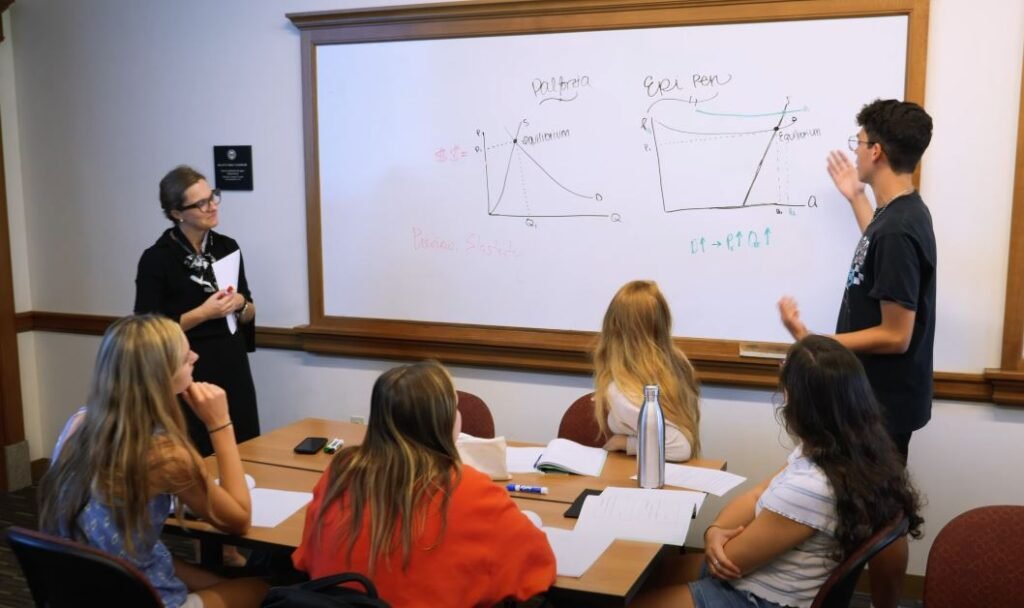
The academic calendar at Boston College is more than just a set of dates; it’s the unseen framework of campus life that establishes when activity peaks and when students can take a break. Every August, as returning students return to their old routines and first-years arrive wide-eyed, the rhythm starts over. As lecture halls fill up and the fall semester begins to take shape in the late-summer sun, there’s a certain ebullience in the air during those first few days.
In a particularly positive way, Labor Day breaks up the early momentum by offering a final taste of summer before the weeks turn into a gradual ascent toward midterms. Another dimension is added during Family Weekend in late September, when the campus transforms into a bustling gathering place for visiting family members and the larger BC community. These in-between-deadlines moments are what help students stay grounded.
Boston College Academic Calendar – Key Highlights
| Key Period | Dates |
|---|---|
| Fall 2025 Classes Begin | August 25, 2025 |
| Labor Day – No Classes | September 1, 2025 |
| Thanksgiving Break | November 26–28, 2025 |
| Fall Final Exams | December 11–18, 2025 |
| Spring 2026 Classes Begin | January 12, 2026 |
| Spring Break | March 2–7, 2026 |
| Easter Break | April 2–6, 2026 |
| Spring Final Exams | May 5–12, 2026 |
| University Commencement | May 18, 2026 |
| Summer Session 1 | May 14–June 27, 2025 |
| Summer Session 2 | June 30–August 8, 2025 |
By mid-October, things pick up speed. Professors start to allude to the size of final projects after drop deadlines have passed. Fall Break provides a brief but revitalizing respite that is remarkably similar to taking a deep breath before plunging in—enough to get students through the upcoming academic challenge. The air gets colder as November approaches, and the level of difficulty of the coursework also increases. Everyone returns with a sharpened focus, even though Thanksgiving, with its promise of a long weekend, arrives just in time to break the monotony.
December is a time for focused work. Study days are incredibly effective at reinforcing material because they are arranged to allow for reflection and revision. The final exams are a marathon that requires timing, accuracy, and endurance because they are given quickly one after the other. The crisp winter air that settles over campus at the end of the semester adds to the overall sense of accomplishment.
Midway through January, when the year is still feeling new, the spring semester starts. In addition to providing a break, the Martin Luther King Jr. Day holiday is a time for introspection, frequently marked by especially motivational events on campus. By February, students settle into a routine, juggling their coursework with the progressively longer days.
Early March’s Spring Break splits the semester into two separate acts. Some use it to rejuvenate on far-off beaches, while others—particularly seniors—use it to polish capstone projects or get ready for job interviews. The community gets a much-needed break before the last academic sprint thanks to the well-timed Easter recess in April.
May final exams are planned with extreme efficiency and precision. The scheduling minimizes conflicts and provides time for review, which lessens the stress of consecutive high-stakes tests. The academic cycle comes to a symbolic and practical end with commencement in mid-May, a ceremony and closure that leaves a lasting impression long after diplomas are given out.
Summer sessions are considerably faster-paced but incredibly versatile because they condense the intensity of a semester into just six weeks. Undergraduates can advance their degrees more quickly with these terms, and graduate students can expand their areas of expertise without losing steam. The requirements of the concentrated format are very clear: concentrated effort produces immediate results.
Beyond the classroom, Boston College’s cultural life is subtly orchestrated by the calendar. Community service projects, student-led conferences, and varsity athletics are all scheduled to prevent significant academic conflicts. Students and faculty have plenty of opportunity to respect their personal traditions without compromising their academic standing because religious and national observances are respected.
Boston College’s scheduling philosophy, which strikes a balance between structure and flexibility, and rigor and rest, is an especially creative approach. It reflects the strategic rhythms of other prestigious universities, where the academic year is structured to be demanding without being overpowering. Graduates are prepared for professional settings where deadlines, preparation, and recovery are intertwined thanks to this deliberate pacing, which creates habits that go beyond the campus gates.
Knowing the calendar gives students a sense of empowerment in addition to practicality. They are able to get the most out of every term by knowing when to push, when to pause, and when to prepare. Alumni frequently remember these cycles as preparation for the rigors of their professional lives, where strategic focus and time management are just as important as any lesson from a textbook.
In the end, the Boston College academic calendar is remarkably resilient in its structure, acting as a framework for success and wellbeing. It serves as a blueprint that subtly influences each lesson, vacation, and holiday, guaranteeing that every school year is not only finished but also fully enjoyed.











